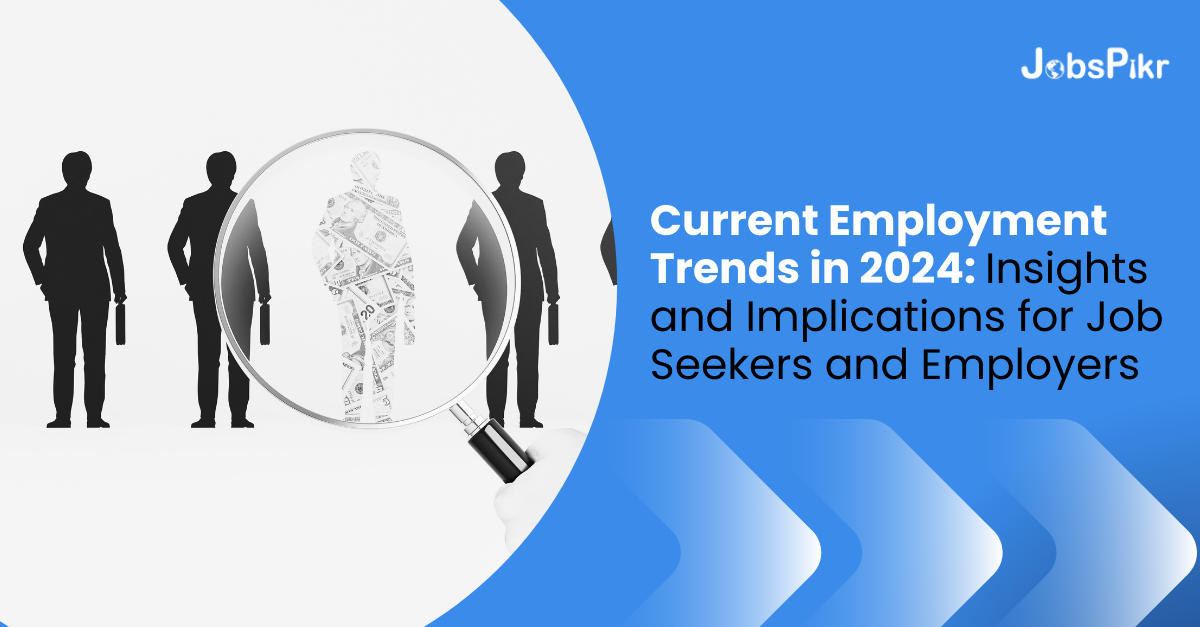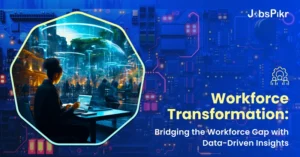As we navigate through 2024, the job market continues to evolve, influenced by technological advancements, economic shifts, and changing work paradigms. Understanding the current employment trends in 2024 is crucial for both job seekers and employers to stay competitive and make informed decisions. This article provides a comprehensive overview of the most significant employment trends this year and discusses how these trends are impacting various industries, job seekers, and employers.

Source: LinkedIn
The Rise of Remote and Hybrid Work
One of the most significant current employment trends in 2024 are the continued rise of remote and hybrid work models. The COVID-19 pandemic accelerated the adoption of remote work, and this trend has become a permanent fixture in the job market.
- Impact on Job Seekers: Job seekers now have more opportunities to find positions that offer flexible working arrangements. This trend has opened up job markets across geographies, allowing candidates to apply for roles without the constraint of location. Additionally, job seekers need to adapt by developing skills for remote work, such as digital communication, time management, and self-discipline.
- Impact on Employers: Employers are adjusting to this trend by offering flexible work options to attract and retain top talent. Companies are investing in technology to support remote work, such as collaboration tools and cybersecurity measures. Additionally, employers are rethinking their office space needs, leading to a rise in co-working spaces and flexible office arrangements.
Emphasis on Skills Over Degrees
Another notable current employee trends in 2024 is the growing emphasis on skills over formal degrees. Employers are increasingly valuing practical skills and experience over traditional educational qualifications.
- Impact on Job Seekers: Job seekers need to focus on building and showcasing their skills, whether through online courses, certifications, or practical experience. Platforms like LinkedIn Learning, Coursera, and Udemy are becoming essential tools for acquiring new skills and staying competitive in the job market.
- Impact on Employers: Employers are adopting skills-based hiring practices, using assessments and real-world tasks to evaluate candidates. This shift helps organizations find the best-fit talent, regardless of their educational background, and promotes a more diverse and inclusive workforce.
Growth of the Gig Economy
The gig economy continues to grow in 2024, driven by the rise of freelance, contract, and part-time work. This trend is reshaping the traditional employment landscape.
- Impact on Job Seekers: Job seekers are exploring gig work as a viable career option, offering flexibility and the opportunity to work on diverse projects. However, gig workers need to manage the uncertainties and lack of benefits associated with freelance work, such as health insurance and retirement plans.
- Impact on Employers: Employers benefit from the gig economy by gaining access to a broader talent pool and the flexibility to scale their workforce according to demand. Companies are leveraging platforms like Upwork, Fiverr, and Freelancer to find specialized skills for short-term projects.
Adoption of AI and Automation
AI and automation are transforming various industries, leading to significant changes in job roles and employment opportunities.
- Impact on Job Seekers: Job seekers need to stay abreast of technological advancements and develop skills that are less likely to be automated, such as creative thinking, problem-solving, and emotional intelligence. Additionally, gaining proficiency in using AI tools and understanding their applications can provide a competitive edge.
- Impact on Employers: Employers are leveraging AI and automation to streamline operations, improve efficiency, and reduce costs. While this may lead to the displacement of some jobs, it also creates new opportunities in fields like AI development, data analysis, and machine learning.
Focus on Employee Well-being
Employee well-being has become a top priority for organizations in 2024. Companies are recognizing the importance of mental health, work-life balance, and overall employee satisfaction.
- Impact on Job Seekers: Job seekers are increasingly considering the well-being policies of potential employers when making career decisions. They are looking for companies that offer comprehensive health benefits, mental health support, flexible work arrangements, and a positive work culture.
- Impact on Employers: Employers are investing in employee well-being programs to attract and retain talent. This includes offering mental health resources, promoting work-life balance, and creating a supportive work environment. Companies are also incorporating well-being metrics into their performance evaluations and corporate goals.
Diversity, Equity, and Inclusion (DEI)
DEI remains a critical focus for organizations in 2024, with a growing emphasis on creating diverse and inclusive workplaces.
- Impact on Job Seekers: Job seekers are prioritizing companies with strong DEI initiatives. They are more likely to join organizations that demonstrate a commitment to diversity and inclusivity through their policies, practices, and culture.
- Impact on Employers: Employers are implementing DEI strategies to foster a more inclusive work environment. This includes diversifying hiring practices, providing DEI training, and creating employee resource groups. Companies are also using data and analytics to track their progress and identify areas for improvement.
Upskilling and Reskilling
The rapid pace of technological change is driving the need for continuous learning and development. Upskilling and reskilling have become essential for maintaining employability and competitiveness.
- Impact on Job Seekers: Job seekers need to embrace lifelong learning and actively seek opportunities to upskill and reskill. This can involve taking online courses, attending workshops, or participating in training programs offered by employers. Staying updated with industry trends and acquiring new skills is crucial for career advancement.
- Impact on Employers: Employers are investing in employee development programs to ensure their workforce remains relevant and capable of meeting future challenges. This includes providing access to training resources, supporting career development, and encouraging a culture of continuous learning. Companies that prioritize upskilling and reskilling can better adapt to technological advancements and remain competitive.
Green Jobs and Sustainability
The focus on sustainability and environmental responsibility is driving the growth of green jobs in 2024. Industries are increasingly adopting sustainable practices, creating new employment opportunities.
- Impact on Job Seekers: Job seekers interested in sustainability can explore careers in renewable energy, environmental management, and green technology. Acquiring skills and knowledge in these areas can lead to rewarding job opportunities in the growing green economy.
- Impact on Employers: Employers are incorporating sustainability into their business strategies, leading to the creation of green jobs. This includes roles in renewable energy projects, sustainable supply chain management, and corporate social responsibility. Companies that prioritize sustainability can attract environmentally conscious talent and enhance their corporate reputation.
Use of Data Analytics for Job Data Analysis
Data analytics is playing a significant role in shaping the current employment trends in 2024. Organizations are using data to make informed decisions, improve processes, and drive business outcomes.
- Impact on Job Seekers: Job seekers with skills in data analytics are in high demand across various industries. Developing proficiency in data analysis tools and techniques can open up numerous career opportunities. Additionally, understanding how to interpret and use data effectively is becoming a valuable skill for all professionals.
- Impact on Employers: Employers are leveraging data analytics to gain insights into workforce trends, employee performance, and recruitment strategies. By analyzing data, companies can make data-driven decisions that enhance efficiency, improve employee engagement, and optimize talent management.

Globalization and Remote Talent Acquisition
Globalization continues to influence employment trends, with companies increasingly seeking talent from around the world. Remote talent acquisition has become more common, allowing organizations to access a diverse talent pool.
- Impact on Job Seekers: Job seekers can now apply for positions with companies located in different countries, expanding their career opportunities. This trend requires job seekers to be adaptable and culturally aware, as they may work with diverse teams and navigate different work environments.
- Impact on Employers: Employers benefit from globalization by accessing a wider range of skills and expertise. Remote talent acquisition allows companies to fill critical roles quickly and efficiently. However, employers must also address challenges related to managing remote teams, cultural differences, and time zone variations.
Conclusion
The current employment trends in 2024 are shaping the job market in profound ways, influencing how job seekers approach their careers and how employers manage their workforce. From the rise of remote work and the gig economy to the growing emphasis on skills over degrees and employee well-being, these trends are driving significant changes across industries. By staying informed about these employment trends and adapting to the evolving landscape, job seekers and employers can navigate the challenges and seize the opportunities presented in 2024.
To stay ahead in this dynamic environment, it is essential for both job seekers and employers to embrace continuous learning, leverage technology, and prioritize employee well-being and inclusivity. As the job market continues to evolve, those who adapt and innovate will be best positioned for success.
For more insights and to explore how our tools can enhance your HR strategy, sign up on JobsPikr today.



